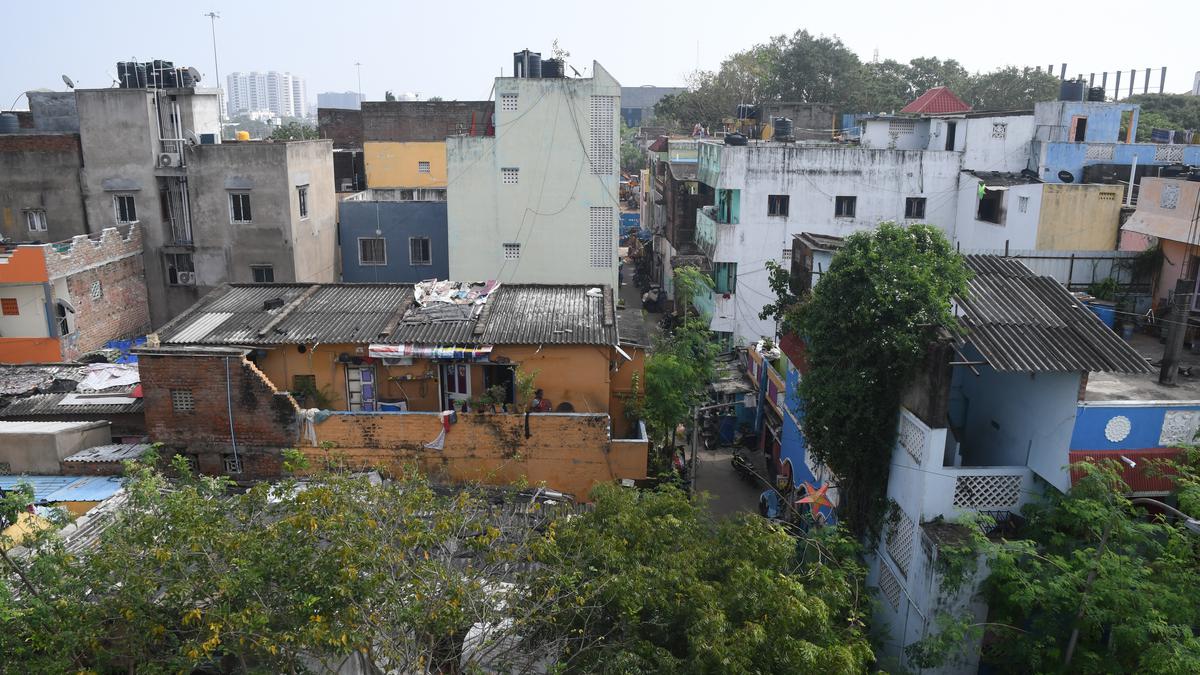
For thousands of families in T.N., the promise of home belied Premium
The Hindu
Tamil Nadu executed three World Bank-funded projects, mainly in Chennai, between 1977 and 1988, through which plots were sold to those residing in slums on a hire-purchase basis. The beneficiaries were to pay a monthly instalment for about 10 years to get ownership of the land. Four decades later, around 85,000 families are yet to get their sale deeds
It is impossible to miss the political symbolism in Meenambal Sivaraj (M.S.) Nagar in the heart of Chennai. At the entrance to the Ambedkar Ground located in one corner of the locality stands an arch, constructed to mark the birth centenary of the leader who gave India its Constitution.
The spot near this ground has busts and statues of Ambedkar, Pandit Iyothee Thass, Rettamalai Srinivasan, ‘Periyar’ E.V. Ramasamy, and A. Sakthidasan (of the Republican Party of India) -- leaders who fought against caste. The area’s name (after leaders N. Sivaraj and Meenambal Sivaraj) and the statues near the ground are an indication of how M.S. Nagar, with a predominantly Dalit population, was once a politically-thriving locality. Ironically, it has been struggling for decades to secure the land rights of its own people.
A few metres away from the ground, 40-year-old Jyoti*, in her house, opens a bag full of yellowing documents, some of which are nearly 70 years old, to show her family’s rootedness in the locality and their continuing struggle to secure ownership for the plot they live in. The documents were safeguarded by her late grandmother in an old trunk that survived many a fire in the locality that was once filled with huts.
One of the oldest documents in Jyoti’s possession is a 1959 certificate provided by the then Corporation of Madras. The photograph in the document shows her grandmother and grandfather, in front of their hut with their three children. “This was the first document recognising that they were residents of this plot. But my grandmother had told me that they had moved here many years before that,” said Jyoti.
After living on the plot for at least 70 years and despite promises made by the government, land rights still elude Jyoti’s family. This is not the story of only Jyoti or the nearly 150 more families in M.S. Nagar, but that of at least 57,000 more families across hundreds of settlements in Chennai and 28,000 more in nine other cities in Tamil Nadu as per conservative estimates of the State government.
While there had been other smaller schemes for providing land to the urban poor, these families were promised land ownership predominantly under three different projects launched by the State government between 1977 and 1988. They were the Madras Urban Development Project (MUDP) I (1977), MUDP II (1980), and the Tamil Nadu Urban Development Project (TNUDP) I (1988), all of which were funded to a large extent by the World Bank, through loans.
These projects marked a departure in the focus of the Tamil Nadu Urban Habitat Development Board (formerly Tamil Nadu Slum Clearance Board), which had until then, focused, to a large extent, on clearing slums and resettling them in multi-storey apartments. In contrast, these projects had a component called “slum improvement,” through which infrastructure was improved by providing basic amenities in areas where the poor had settled, despite not owning the land. The plots were sold to them on a hire-purchase basis with the cost recovery planned through monthly repayments for a fixed number of years.

The Karnataka government has drafted a comprehensive master plan for the integrated development of Kukke Subrahmanya temple, the State’s highest revenue-generating temple managed by the Hindu Religious Institutions and Charitable Endowments Department. The redevelopment initiative is estimated to cost around ₹254 crore and aims to enhance infrastructure and facilities for devotees.












